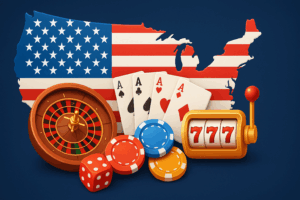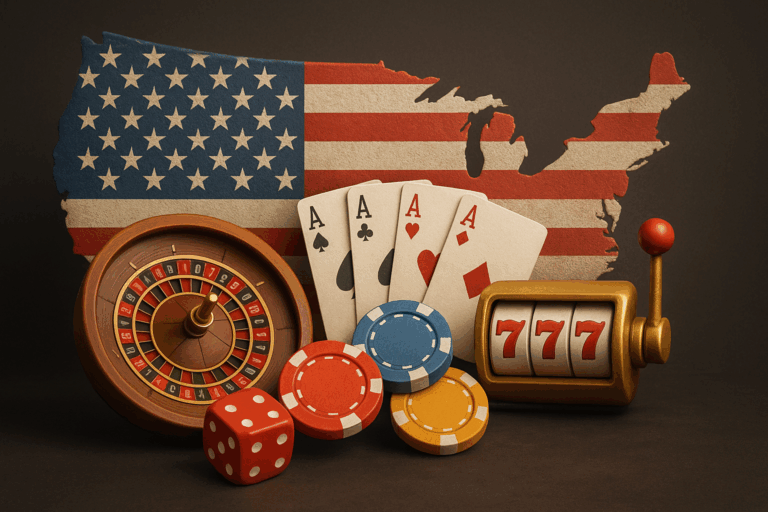States where gambling is legal in the US have expanded rapidly over the last decade, reshaping how Americans enjoy casino games, sports betting, and online platforms. Since the 2018 Supreme Court decision that allowed states to regulate gambling individually, the industry has grown into a multi-billion-dollar market. Today, nearly every state permits some form of gambling — whether through casinos, sports betting, or charitable gaming — while a few states remain exceptions.
In this guide, we’ll break down where gambling is legal in 2025, which states lead in casino and sports betting markets, and what to expect if you’re considering playing online or in person.
 Casino Gambling: Where to Play
Casino Gambling: Where to Play
Casino gambling is widespread in the U.S., with nearly every state offering some form of casino gaming. This includes commercial casinos, tribal casinos, and racinos (racetrack casinos). Nevada and New Jersey are particularly notable for their robust casino industries, with Nevada being home to the famous Las Vegas Strip and New Jersey housing the Atlantic City casinos.
Other states with significant casino offerings include:
Pennsylvania: Home to several large casinos and a major contributor to state gaming revenue.
Michigan: Offers both commercial and tribal casinos, with Detroit being a major hub.
Oklahoma: Hosts one of the largest casinos in the U.S., the WinStar World Casino, which boasts a gaming floor of 400,000 square feet
It’s important to note that while many states have legalized casino gambling, the specific regulations and offerings can vary widely. Some states may only permit tribal casinos, while others allow both commercial and tribal operations.
Sports Betting: Expanding Access
Since the repeal of PASPA in 2018, sports betting has rapidly expanded across the United States. As of 2025, 38 states, along with Washington D.C. and Puerto Rico, have legalized sports betting in some form. Of these, 30 states offer online sports betting, allowing residents to place bets via mobile apps and websites.
Notable states with legalized sports betting include:
New Jersey: A pioneer in online sports betting, offering a wide range of options through various licensed operators.
Colorado: Known for its competitive market and numerous betting platforms.
Illinois: Offers both retail and online sports betting, with several major sportsbooks operating in the state.
Each state has its own regulatory framework, which can affect aspects such as tax rates, licensing requirements, and the types of bets allowed. For instance, Massachusetts imposes a 15% tax on in-person sports bets and a 20% tax on online bets
Online Gambling: The Digital Frontier
Online gambling, encompassing casino games, poker, and sports betting, has seen significant growth in states that have legalized it. As of 2024, seven states have fully legalized and regulated online gambling, including both casino games and sports betting:
New Jersey: A leader in online gambling, offering a wide range of games and platforms.
Pennsylvania: Provides a comprehensive online gambling experience with numerous licensed operators.
Michigan: A newer entrant with a rapidly growing online gambling market.
Other states, such as New York, Illinois, and Arizona, have legalized online sports betting but have not yet authorized online casino games.
It’s important to ensure that any online gambling activities are conducted through licensed and regulated platforms to ensure fairness and security.
 Charitable and Social Gambling
Charitable and Social Gambling
Some states permit charitable and social forms of gambling, which can include activities like bingo, raffles, and poker nights organized by nonprofit organizations. For example, New Hampshire allows charitable gaming, including poker and bingo, and has legalized historical horse racing at charitable gaming facilities.
These forms of gambling are typically regulated at the state level and often have specific requirements regarding licensing and revenue allocation.
States Where Gambling Remains Illegal
While the majority of states have legalized some form of gambling, a few still maintain strict prohibitions. Utah and Hawaii are the two states where gambling is illegal in nearly all forms, setting them apart from the rest of the country.
Utah has deep cultural and religious roots that oppose gambling. The state constitution explicitly prohibits all games of chance, and lawmakers have historically shown no interest in revisiting the issue. Residents who wish to gamble must travel to neighboring states like Nevada or Colorado.
Hawaii also enforces a broad ban on commercial gambling, including casinos, sports betting, and even state lotteries. The main concern among legislators has been protecting the tourism-driven economy and avoiding potential social costs linked to gambling. That said, debates occasionally resurface in the legislature, especially around the idea of a lottery or limited online betting to generate tax revenue.
Even in these states, residents sometimes access online poker rooms, offshore sportsbooks, or daily fantasy sports platforms, though the legality of such activities remains a gray area. Enforcement is generally focused on operators rather than individual players, but it’s important to understand the risks involved when using unregulated sites.
For those living in states without legalized gambling, regional access plays a big role. For example, Utah residents often visit Las Vegas, while Hawaii residents sometimes gamble in Pacific-Asian destinations like Macau.
At this point, there are no signs that Utah will change its stance, but Hawaii continues to see periodic proposals to introduce a lottery or regulated betting to fund public programs.
Final Thoughts
The legal landscape of gambling in the United States is both diverse and constantly changing. As more states embrace casinos, sports betting, and online platforms, opportunities for players continue to grow — but so does the complexity of understanding where and how gambling is legal.
If you’re exploring states where gambling is legal in the U.S., remember that regulations vary widely. Some states offer full-service casinos, online poker, and sports betting, while others only allow tribal casinos or charitable gaming. A small handful, like Utah and Hawaii, remain firmly opposed to any form of legalized gambling.
To gamble safely and responsibly:
Check official sources: Always confirm the latest rules through your state’s gaming commission or regulatory body, since laws can shift quickly.
Use licensed operators: Stick with regulated casinos, sportsbooks, and online platforms to ensure fair play and consumer protections.
Set limits: Whether online or in person, establish clear spending limits to keep gambling fun and sustainable.
Know the resources: Many states offer hotlines and support programs for those struggling with problem gambling.
As the industry evolves, more states may move toward legalization — especially in online gambling and sports betting — making it an exciting space to watch. For players, staying informed is the key to enjoying the experience while avoiding legal or financial risks.



